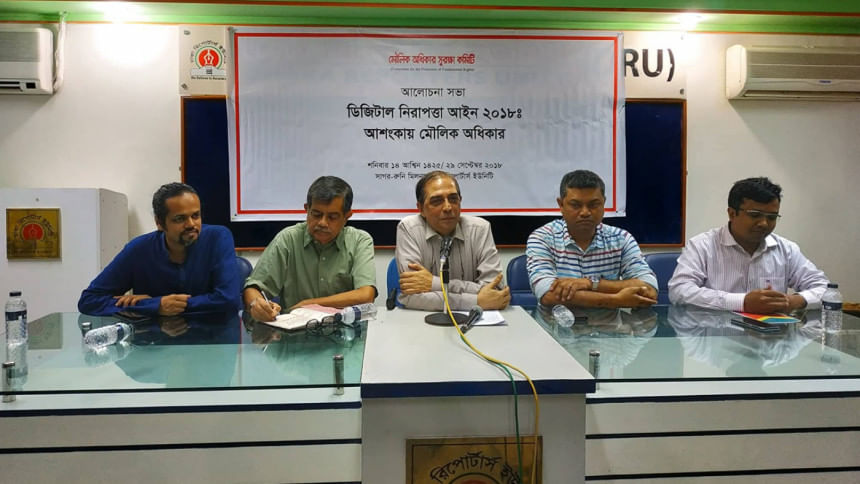Free speech will cease to exist

Terming the Digital Security Bill draconian, some legal experts yesterday said freedom of expression would no longer exist in the country if the law was enacted.
“There might be freedom of expression if we are speaking through loudspeakers but what will be the consequences if the media exercises it using a computer, internet and the like?” said eminent jurist Dr Shahdeen Malik at a discussion at Dhaka Reporters Unity yesterday.
The Committee for the Protection of Fundamental Rights, a citizen's platform, organised the discussion.
It said many sections in the bill contained vague wordings, leaving room for misuse or misinterpretation, which would ultimately curb people's liberty and rights.
Citing various negative aspects of the bill, Dr Mahbubur Rahman, a law teacher at Dhaka University, said, “Where India and Pakistan give punishment of two to three years for an offence, Bangladesh gives life-term [sentences] for the same offence”.
Pointing to the arrest of eminent photographer Shahidul Alam, Supreme Court lawyer Jyotirmoy Barua said, “What crimes did he commit by speaking on live videos that he had to be behind bars for 60 days?
“Then the people who are involved in corruption, embezzling crores of taka -- their whole families should be behind bars. Who is deciding the punishment?” he asked.
He added that the Right to Information Act, 2009 was the only law that gave people the right to hold the government accountable. But the government was neglecting its citizens by passing the Digital Security Bill.
CR Abrar, a professor of international relations at DU, who moderated the programme, said the government had created an atmosphere of fear by passing the Digital Security Bill.
“I am curious as to why the Awami League kept the ICT Act, 2006 effective in their time, which they opposed during the BNP period.”
Shahdeen Malik, expressing his frustration over the journalist community for limiting their focus only on Section 32, said, “In my view, Section 32 of the law is a less dangerous one. There are several other horrific sections from which the focus has been diverted by them [journalists].
“Many things happen that we overlook. Such things also happened here in the Digital Security Bill…It's like an earthquake. Freedom of speech will no longer exist if it is executed.”
On the issue of freedom of expression, he said “We draw the example of the US democracy now and then; you may say the US is a developed country, so there can be no comparison with it.
“But can't we reach the level [of democracy] that the USA had reached some 200 years ago in 1791? The US constitution in 1791 stated that Congress won't be able to formulate any law that may gag the freedom of expression.
“That's it. What can be said and what not…they had said it 200 years ago. And here if we say anything, it would be a crime…we passed this law.”
Shahdeen Malik said that he was surprised that people were requesting the President not to sign the bill.
“As far as my knowledge goes, only one or two presidents refused to give consent in few provisions of one or two laws in the last 30 years. And now we are urging the President to do so,” he said.
Malik said there was a necessity of having a law for crimes like hacking or stealing information by illegally accessing computers and the newly passed law covered it.
“But how does the issue of freedom of speech come into it?” he said, adding that he thought such things have been included to gag the people's voice.
Malik also criticised the vagueness in the wording regarding the formation of the Digital Security Agency, Emergency Response Team, Digital Security Council and their powers.
Gonoshasthaya Kendra founder Zafrullah Chowdhury was also present at the programme, held at Dhaka Reporters Unity.
The much-debated Digital Security Bill 2018 was passed by Jatiya Sangsad on September 19, with harsh provisions allowing police to search or arrest anyone without a warrant.
Journalists and rights activists have expressed concerns about the new law, saying it was passed without addressing their concerns.

 For all latest news, follow The Daily Star's Google News channel.
For all latest news, follow The Daily Star's Google News channel. 








Comments